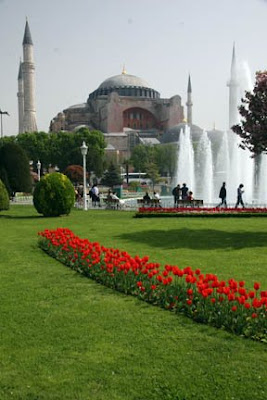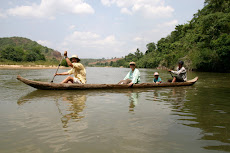
This is one of our favorite cities - food, history, architecture, fun people, and wide vistas - accessible and exotic. We arrive at the end of the annual Tulip Festival and Spring flowers are everywhere. Jean and I were last here together about 20 years ago. Like us - some things are the same but much has changed.

Still the massive Roman / Crusader/ Ottoman walls; the beautiful waters of the Bosporus and Golden Horn; the Blue Mosque with its 6 minarets - and the incredible Hagia Sophia Church - built in the 5th Century and still the biggest in the world when it became a mosque as Islam overran this part of the world - 10 centuries later.

There are still the little barbershops and big bazaars - with the piles of spices we remember now replaced by tourist trinkets. New bridges span the two continents symbolizing the span of time that is the bedrock of Istanbul where "New" can mean built in 1597. There are growing bridges between East and West - between the European and the Asian sides of this city - this country and ours and the Islamic world. Or so I would like to believe.


There are more people of course, too many of them refugees from surrounding strife - Iraq, Iran, the Balkans and the ex-USSR. Many of these added people are no longer looking west or even forward. They are pulling their heads into shells endangering the hard progress Turkey has made in becoming a modern country.
In 1915, when Granddad faced the Ottoman army at Gallipoli, he faced a fabled man who grabbed commanded of the Turkish forces there - just in time to avoid their defeat. His name was Mustafa - Turks only took one name when he was born. With the end of WWI and the breakup of the Ottoman Empire, he grabbed the reins of power and forced Turkey to look to the West and enter the modern world. He picked a future for his country with wisdom - when Islam wanted Hagia Sophia to stay a mosque and Christians wanted to return it to a church - Mustafa made it a secular museum - for all Turks and the whole world to enjoy. His vision is the difference between today's Turkey and the stagnation that plagued the rest of the Islamic East - and mostly still does.

By his command, Turkey quit the difficult Arabic alphabet for our Roman one; forbid religious dictation of dress, marriage, courts - and any roll for religion in military or civic professions. To allow modern records organization he had everyone choose a family name. He took the last name of Ataturk - which means, "Father of the Turks." Turkey is, by his constitution, a strictly secular nation.
 But these are the times that try the secular soul. We see many more young women in scarves and full coverings of various symbolic styles. Politics has followed suit with an Islamist party now ruling Parliament - at least until the election next year - or maybe longer if trends continue.
But these are the times that try the secular soul. We see many more young women in scarves and full coverings of various symbolic styles. Politics has followed suit with an Islamist party now ruling Parliament - at least until the election next year - or maybe longer if trends continue.Turkish headlines scream of teachers using religious scare tactics to force prayers and Islamic dress. Demonstrations are getting heated. Far out in the countryside we see city busses full of children or the faithful, being given free tours of historic sites by "guides" armed with an altered history full of Allah and Islamic togetherness. Our translator only shakes her head as she tells us what is being fed to these people in preparation for the next election - and what many other young educated people tell us they fear - a theocracy - becoming another Iran.

 I cringe at the news from my own country of some school board slipping Christian rightwing creationism into a science class - then look around at Turkey - a NATO member, with a huge army, rich in resources and astraddle a major artery of commerce - and the gateway between Europe and the Middle East - a gate that can be open or closed by what is happening here - and at home. I hope someone is thinking about this other than just us. The world doesn't need any more Crusaders - but we could use a few more Ataturks.
I cringe at the news from my own country of some school board slipping Christian rightwing creationism into a science class - then look around at Turkey - a NATO member, with a huge army, rich in resources and astraddle a major artery of commerce - and the gateway between Europe and the Middle East - a gate that can be open or closed by what is happening here - and at home. I hope someone is thinking about this other than just us. The world doesn't need any more Crusaders - but we could use a few more Ataturks.- Secular Stew
